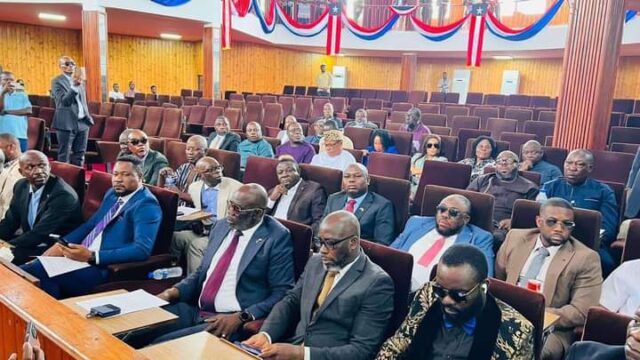
The William R. Tolbert joint chambers of the legislature, which are officially designated for joint legislative sitting and the State of the Nation Address (SONA), have become the primary office for majority lawmakers advocating for the removal of the speaker.
Currently, over 43 lawmakers utilize this space for their regular sessions. They have expressed a vote of no confidence in the leadership of Speaker, J. Fonati Koffa.
Consequently, they frequently convene in this chamber to deliberate on matters they perceive to be in the best interests of the country, including the removal of speakers.
This article brings perspectives of reporters covering the legislature as the saturation worsens. Stage Media brings in the perspective of legislative reporters.
See related stories here, here, and here for background on the ongoing removal saga.
Gerald Koinyeneh, President of Legislative Press Pool and Newsroom Chief of Frontpage Africa newspaper, described the current saturation as a deadlock because the two groups are claiming legitimacy.
“Those who are calling for the removal of the speaker are saying they are in majority so they no longer want to sit under the gavel of the speaker; they have passed a vote of no confidence in him, so as a result, since the rules say simple majority can constitute a quorum, they meet quorum so they will be conducting the business of the House of Representatives.”
Then the speaker and his team are saying they are wrong. The speaker is not sick, he’s not inept, he’s present, he’s elite, he’s not disabled alert, and as such, he should preside. And if anybody wants to remove him, any group, they should meet two-thirds; what the constitution says and what their rules say,” he added.
Quoting both rule 9.1 and rule 9.2, Koinyeneh said even a simple majority constitutes a quorum, but it can not impeach the speaker nor expel a member.
Rule 9.1 states that “the Speaker, Deputy Speaker and other Officers of the House may be removed from office for cause by a resolution of a two-thirds majority of the member of the House. “ 9.2 A member may be expelled from the House for cause by a resolution of a two-thirds majority of the members of the House.”
“Sometimes, the minority is right because the minority gathered in the constituted area, the place they have the session, and it is being presided over by the speaker, deputy speaker, sergeant-at-arm, and the Chief Clerk. All of them in that chamber are elected, so all of them in that chamber means it is legal.
He said, “When there is no majority, the minority that is there, the law gives them the power to pass a single motion to either adjoin or to compel the others to join.”
Dorcas Gboerreh-Boe, former vice president of Legislative Press Pool, described the removal proceeding as both political and legal.
“At that time, Alex Tyler lost the political battle for which he had the option to pursue the legal means but he did not. So, for their own rules, say two-thirds, and two-thirds of 73 is 49.”
Gboerreh-Boe added that the rule gives rights to the majority and it also gives rights to the minority, noting that the minority can adjourn from time to time and compelled the majority to come to session.
Comparing the others’ removal processes, Gboerreh-Boe said, “It is one to the laps of the speaker to resign. Like the Honorable Snowe said, for me, I did not follow Snowe’s removal but he said on the radio that he was pressured because he received calls from several individuals asking him to resign.
And at his age at that time, he said he was 36 and he was young so he decided to listen to all of the calls and resign the same as Tyler, but this speaker was saying he was going to hold on to the law; he’s not going to resign.”
Gboerreh-Boe said it is important that the majority block goes to the main chamber and follows the rules.
“Since this is the first, I don’t know if I should say precedent case because all of these did not happen at the time of speaker Tyler’s removal… the majority did not go to the joint chamber until he was removed but now that speaker Koffa is calling on his colleagues to go to the chamber, I am sure he is going to recuse himself and the deputy speaker preside and he will answer to the allegation against him,” she added.
Prince Mulbah, Prime FM Legislative Reporter, said that even though the law provides due process for an accused, due process has not been required at this Legislature, adding that the majority have always had their will.
Mulbah said the intent of the majority block having separate sessions in the joint chamber of the legislature is to undermine the legitimacy of the speaker.
“If the speaker cannot constitute a quorum, he will not conduct a business as the law provides,” he added.
Winston Blyden, Bana FM Legislative Reporter, said in past times the speaker has been coerced to resign, adding that in the case of Alex Tyler, his removal lasted for a very long time but since Koffa is an experienced lawyer, he may not easily concede like Snowe and Tyler.
As the political fright intensified up Capitol Hill, a high-powered delegation from the Economic Community of the West African States (ECOWAS) Parliament headed by its Speaker came to settle the crisis and restore peace to the legislature. However, after the departure of the ECOWAS Parliament delegations, the House of Representatives on Tuesday, November 19, 2024, still experienced two separate sessions.




